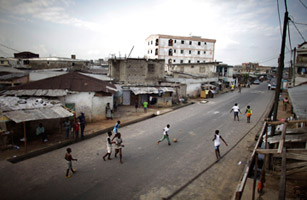
Children play football on the streets in Douala, Cameroon May 22, 2010.
(4 of 4)
But there is more to the soccer phenomenon than voyeurism or national vanity. Just how much more is becoming evident with the first staging of the World Cup in Africa. The fascination the game holds is being used as a tool for social good. Soccer is being employed as bait to lure young people in Africa, and also in Latin America and Asia, to raise educational standards and increase awareness of how to combat AIDS, malaria and other diseases that need not kill as many millions as they do. Africa, in particular, has seen dozens of such programs in the buildup to the World Cup, often with FIFA, soccer's international governing body, actively involved. Nike and Adidas run AIDS-awareness and education campaigns linked specifically to soccer. The Spanish national team, a favorite to win this World Cup, is promoting the battle against malaria.
Eto'o and other African players who have seen their dreams of wealth and fame come true are playing their parts in linking sports and social development. Eto'o has created and poured millions of dollars into a foundation for African children that links soccer, education and health. "The foundation is about sharing the smile I have on my face with as many people as possible," Eto'o says. "The most important thing for me is to know that when I give a child boots to play soccer or I take him to Europe to resolve a health problem or I give him a scholarship for his studies, that I make him happy."
The African Moment
Happy and, with luck, more prosperous. Francois Pienaar, one of the sporting icons of South Africa — captain of the team that won the rugby World Cup in 1995 — sees a great opportunity this year to project a new image of the African continent, to revitalize economies, strengthen nations and imbue people with a new pride. "We've built the infrastructure. We've met our deadlines. We've built new, first-class airports. We will show the world Africa can stage the greatest show on earth," said Pienaar, whose role in the 1995 rugby campaign, during which he forged a strong bond with Nelson Mandela, provided a healing balm to a country that at the time still faced the risk of a race war. "Look how far we've come. We're at peace. We're hosting the soccer World Cup. But it's much more than about South Africa. This is going to be a World Cup for the whole of Africa, a continent about which people have always been circumspect but which, the world will see, can and will go places."
Eto'o echoes the big white African's words: "My greatest desire is that we seize the chance to show that if we are given the opportunity, we can work as well as anybody, that we are up to the mark. And I am sure we will show it." He has faith that Africa will perform wonders on the soccer field too. "If I had not played for my country, everything else I have achieved would have left me with an empty feeling." Cameroon, along with Ivory Coast, is the African team to beat in the World Cup, the one with the most accomplished set of players performing at a high level in the European leagues. But Eto'o says his first loyalty is to the continent. "I am an African before a Cameroonian," he says. "I would like my country to win, but if we fall, I will support any other African team that remains standing and celebrate their triumph with equal joy."
Could an African team actually win the first African World Cup? Difficult. Spain, the reigning European nations' champion, looks menacingly complete. Argentina has the magical Messi. England, with the formidable Capello as coach, is feared by all. Germany and Italy always raise their game at the World Cup. Brazil is, well, Brazil. But soccer — another big reason for its global appeal — throws up more surprising results more often than any other team sport. Italy, for example, lost to North Korea in the 1966 World Cup. Cameroon, for that matter, came within a hair's breadth of beating England in the 1990 quarterfinals. With the support of the wildly enthusiastic, soccer-fanatical South African crowds, the impossible dream could, maybe, come true.
As it has done for Samuel Eto'o, who far exceeded the goal he set himself at a press conference on the day he joined Barcelona. Wittily, and somewhat controversially, he declared, "I mean to run like a black man so I can live like a white one." Reminded of that phrase, sitting in the lush garden of the Bulgari Hotel, in the suites of which he had ample space to sleep and could choose from a vastly expensive array of room-service options with no notion of the rainwater coming in through the ceiling, Eto'o turns serious and nods. "Yes," he says. "But it's a shame people didn't pick up on the deeper message I wanted to convey. What I meant to say was, Give us the same opportunities, and we can be as good as anybody." In the next month, he and his African colleagues will have the chance to prove it.
Carlin is the author of Playing the Enemy, about the 1995 rugby World Cup — on which the movie Invictus was based — and White Angels, about Real Madrid.